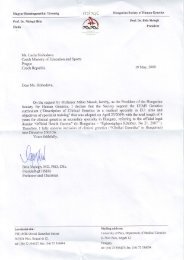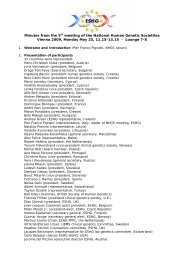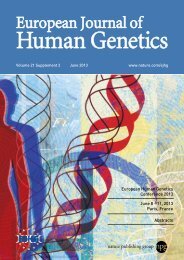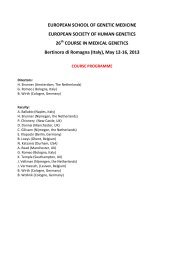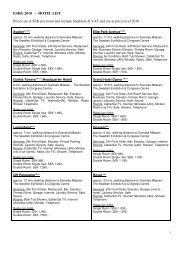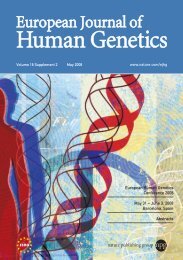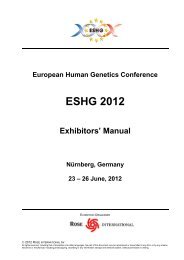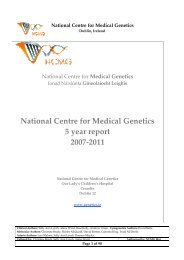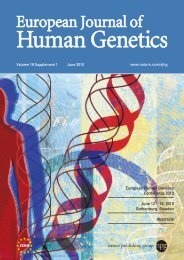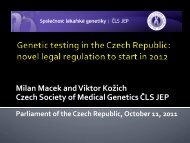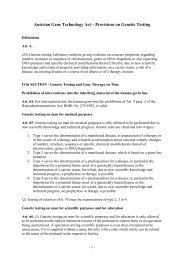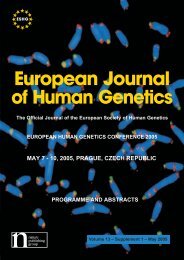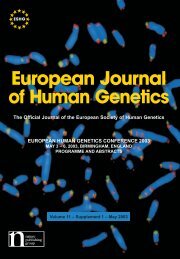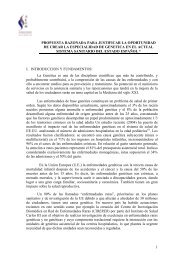2009 Vienna - European Society of Human Genetics
2009 Vienna - European Society of Human Genetics
2009 Vienna - European Society of Human Genetics
Create successful ePaper yourself
Turn your PDF publications into a flip-book with our unique Google optimized e-Paper software.
Genetic counseling <strong>Genetics</strong> education, Genetic services, and Public policy<br />
regarding future recurrence risks and options for prenatal diagnosis.<br />
Although there is literature outlining how useful external examination<br />
<strong>of</strong> a fetus with congenital abnormality can be, there is little available<br />
to describe how this should be done and what the examination findings<br />
may indicate. The aim <strong>of</strong> this tool is to provide such guidance in a<br />
modern, online format.<br />
It has been developed within the DYSCERNE project, an EU funded<br />
project which has established a Europe-wide network <strong>of</strong> centres <strong>of</strong><br />
expertise in dysmorphology. Further information about DYSCERNE<br />
can be found on the website www.dyscerne.org which serves as the<br />
access point to registered users for this educational tool.<br />
The format is a short PowerPoint presentation which can be followed<br />
sequentially, or readers can navigate using links on the contents page<br />
to specific sections <strong>of</strong> interest. There are links to downloadable documents<br />
and useful pr<strong>of</strong>ormas at designated points in the presentation<br />
which provide practical assistance with carrying out the fetal examination<br />
as well as detailed reference information.<br />
This is the first in a series <strong>of</strong> tools created by the DYSCERNE project<br />
which aim to guide and educate clinicians throughout Europe on key<br />
aspects <strong>of</strong> clinical dysmorphology.<br />
P01.10<br />
DYscERNE: Developing clinical management guidelines for<br />
dysmorphic conditions<br />
P. M. Griffiths1 , K. Strong1 , S. Gardner1 , R. Day1 , C. Harrison1 , D. Donnai1 , B.<br />
Kerr1 , K. Metcalfe1 , H. Brunner2 , B. Dallapiccola3 , K. Devriendt4 , M. Krajewska-<br />
Walasek5 , N. Philip6 , J. Clayton-Smith1 ;<br />
1 2 University <strong>of</strong> Manchester, Manchester, United Kingdom, Universitair Medisch<br />
Centrum Sint Radboud, Nijmegen, The Netherlands, 3Instituto Mendel, San<br />
Giovanni Rotondo, Italy, 4Katholieke Universiteit Leuven, Leuven, Belgium,<br />
5 6 Instytut Pomnik-Centrum Zdrowia Dziecka, Warsaw, Poland, Assistance Publique<br />
- Hospitaux De Marseille, Marseille, France.<br />
Delivering high quality genetic services requires healthcare pr<strong>of</strong>essionals<br />
to develop evidence based guidelines which are subject to<br />
validation and quality checks. However, in clinical genetics, there is<br />
a paucity <strong>of</strong> guidelines, particularly for rarer conditions. Additionally,<br />
many guidelines produced have not used a robust methodology.<br />
A main aim <strong>of</strong> the DYSCERNE Network <strong>of</strong> Centres <strong>of</strong> Expertise in dysmorphology<br />
(www.dyscerne.org) is to develop management guidelines<br />
for dysmorphic conditions. A scoping exercise identified, Angelman,<br />
Noonan, Williams and Kabuki Syndromes as conditions that would<br />
benefit from guidelines. Guidelines will include; criteria for diagnosis,<br />
information on clinical management at different life stages, and when<br />
specialist referral is needed.<br />
DYSCERNE’s guideline development methodology utilises a modified<br />
SIGN (Scottish Intercollegiate Guidelines Network) methodology.<br />
SIGN’s methodology involves systematic review and grading <strong>of</strong><br />
published evidence, and uses multidisciplinary groups <strong>of</strong> clinicians to<br />
achieve expert consensus. This validated and internationally accepted<br />
methodology assumes a rich evidence base and has previously been<br />
used to develop guidelines for a range <strong>of</strong> conditions including cancers<br />
with strong genetic components. However, for rarer diseases, the evidence<br />
base is very small or non-existent, and we have adapted the<br />
process so more emphasis is placed on expert opinion and consensus,<br />
whilst maintaining systematic rigor and transparency.<br />
Our programme <strong>of</strong> guideline development is ongoing and subject to<br />
continuous appraisal so modifications can be incorporated where necessary.<br />
The development protocol will be available on our website and<br />
it is hoped that others will be encouraged to utilise this approach to<br />
develop much needed guidelines for rare diseases.<br />
P01.11<br />
Role play as teaching tool for communication skills in prenatal<br />
genetics<br />
A. Kondo, Y. Nishijima, Y. Onuki, H. Yokoyama, M. Mizoguchi, S. Izumi;<br />
Tokai University School <strong>of</strong> Medicine, Isehara, Japan.<br />
It is well known that role play is very effective learning tool to obtain<br />
communication skill. In Japan, our medical students learn communication<br />
and medical interview in 4 th and 5 th year <strong>of</strong> 6 years education.<br />
In this study, we assessed the roleplays by 5 th year student with the<br />
situation <strong>of</strong> prenatal settings to see how they could apply their skills<br />
to rather complicated cases. We made a lecture about prenatal tests<br />
and discussed with students beforehand and asked them to play as a<br />
doctor, a nurse and a patient. This tutorial normally takes place for 2<br />
or 3 students each time. We recorded all conversation with shorthand<br />
to look back easily just after they have done. We also discussed their<br />
skills and feelings afterwards. Role play time was about 35 minutes in<br />
average.<br />
The result shows students are very flexible to put their knowledge into<br />
practical use in different situations and made supportive attitude. However<br />
it seemed difficult to choose less harmful words to explain. Interestingly,<br />
they pretty much included what they think interesting such as<br />
new genetics techniques rather than basic genetics to explain genetic<br />
conditions. In addition, it was easier than exam to see what and how<br />
they understand through observing how they explain each things and<br />
it was good for teaching staffs to review themselves. Roleplay in small<br />
group learning is good tool for teaching communication skills and difficult<br />
issues in clinical settings. It also was good opportunity to have<br />
active discussion in rather shy students.<br />
P01.12<br />
Nowgen’s new Darwin-inspired molecular genetic workshop for<br />
school students<br />
L. E. Holmes1,2 , K. Mathieson1,2 , P. Finegold1,2 , H. R. Middleton-Price1,2 , D.<br />
Donnai1,2 ;<br />
1Nowgen, A Centre for <strong>Genetics</strong> in Healthcare, Manchester, United Kingdom,<br />
2The University <strong>of</strong> Manchester, Manchester, United Kingdom.<br />
Nowgen works closely with students and teachers to ensure that the<br />
next generation appreciate the scientific, social and ethical issues associated<br />
with genetics. One part <strong>of</strong> this work is our programme for<br />
post-16 biology students. This year, to celebrate Charles Darwin’s<br />
200th birthday, Nowgen has been commissioned by the Wellcome<br />
Trust to develop and deliver a new molecular genetics practical workshop<br />
exploring human evolution.<br />
This project has enabled Nowgen to push the boundaries <strong>of</strong> A-level<br />
practical work, serving as an exemplar to the scientific education community.<br />
The practical investigates the students’ own genotypes at one<br />
variable SNP in the TAS2R38 bitter taste receptor gene. Further bioinformatics<br />
work investigates the same gene in chimpanzees, to show<br />
that the two species have undergone convergent evolution, the acquisition<br />
<strong>of</strong> the same trait via independent biological processes.<br />
During the one-day workshop students determine their bitter-tasting<br />
phenotype, extract their own DNA, set up PCR and restriction digest<br />
reactions, and run their results on an agarose gel. The results, viewed<br />
instantly with fluorescent DNA stain, provide information about their<br />
bitter-tasting genotype, leading to discussions regarding the correlation<br />
between phenotype and genotype and the level <strong>of</strong> determinism<br />
<strong>of</strong> our genes.<br />
Our current A-level workshop is highly acclaimed by teachers, and<br />
heavily subscribed. Building on this success, Nowgen is delivering 75<br />
Darwin-inspired workshops to 1875 students throughout <strong>2009</strong> - 2010.<br />
The practical will also be run in two other science centres in the UK,<br />
with a national impact on over 5000 students.<br />
P01.13<br />
Ethical issues and subsequent governance in the GEN2PHEN<br />
project<br />
A. Cambon Thomsen1 , A. Pigeon1 , E. Rial-Sebbag1 , P. A. Gourraud1 , M.<br />
Thomsen1 , &. GEN2PHEN consortium2 ;<br />
1 2 Inserm, U558 & University <strong>of</strong> Toulouse, Toulouse, France, Department <strong>of</strong><br />
<strong>Genetics</strong>, University <strong>of</strong> Leicester, Leicester, United Kingdom.<br />
The GEN2PHEN project aims to unify human and model organism<br />
genetic variation databases towards increasingly holistic views into<br />
Genotype-To-Phenotype (G2P) data, and to link this system into other<br />
biomedical knowledge sources via genome browser functionality.<br />
It involves participants from 14 countries. The regulatory and ethical<br />
framework was analysed for the 3 main levels addressed in the project:<br />
Getting data in; Data storage & infrastructure ; Getting data out.<br />
The work on ethical issues involved also examination by questionnaire<br />
plus interview <strong>of</strong> the ethical issues command by project participants,<br />
leading to the production <strong>of</strong> a grid <strong>of</strong> issues that should be applied to<br />
any set <strong>of</strong> data entering the G2P system or emerging from it. The main<br />
ethical issues examined were initial informed consent content in order<br />
to allow GEN2PHEN to be used, appropriate feedback to individuals<br />
and communities regarding results, anonymization check, manage-



